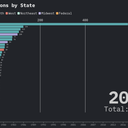
For the first time in more than a decade, a jury in Wake County, North Carolina has sentenced a defendant to death. On March 4, 2019, a capital sentencing jury voted to impose the death penalty upon Seaga Edward Gillard, convicted of the double murder of a pregnant prostitute and her boyfriend, who was assisting her in her business. It was the county’s tenth death-penalty trial since 2008, but juries had rejected a death sentence in each of the previous nine cases. Prosecutors portrayed the Caribbean-born Gillard as a man who preyed on sex workers and told the jury that the case was about securing “maximum justice.”
The sentence bucks a trend in North Carolina, where the use of the death penalty has declined significantly over the last decade. Just 14 death sentences have been imposed in the state from 2009 – 2018 – more than a 90% decline off the peak of 241 death sentences imposed from 1991 – 2000 – and North Carolina has not carried out an execution since 2006. However, Wake County has continued to be an outlier in the state. The ten Wake County prisoners on North Carolina’s death row at the end of 2012 placed the county among the 2% of counties that accounted for 56% of all prisoners on U.S. death rows. Gretchen Engel, executive director of North Carolina’s Center for Death Penalty Litigation criticized the prosecution as wasteful and discriminatory. “Since taking over as Wake district attorney, Lorrin Freeman has pursued the death penalty more than any other prosecutor in North Carolina, costing taxpayers millions of dollars,” Engel said. “That is a poor investment, even in this case.”
Wake County has had four capital trials since Freeman’s election in 2014, with another capital case in jury selection. Eight of the ten prisoners on the county’s death row are Black, one is Latino, and just one is white, and eight of the ten defendants tried capitally since 2008 have been Black. “All it shows is that, if you try ten death penalty cases in a row and exclude from the jury all the people who oppose the death penalty, you can find a jury that will sentence a person to death despite the death penalty’s documented unfairness,” Engel said. Although Engel said Gillard committed a serious crime for which he should be punished, she questioned whether his crime was “the worst of the worst.” In March 2016, Wake County jurors sentenced Nathan Holden to life for the double-murder of his ex-wife’s parents and attempted murder of his ex-wife. In January 2018, in a crime Freeman had called “everybody’s worst nightmare,” a jury also sentenced Donovan Jevonte Richardson to two life sentences for a home break-in that ended in a double murder. “Wake County jurors have refused to impose the death penalty in other double homicide cases and even in a case in which the defendant was convicted of murdering five people,” Engel said. “All today’s verdict shows is what we already knew: That the death penalty is imposed arbitrarily, and disproportionately on black men.”
(Josh Shaffer, Death sentence given to killer who terrorized sex workers, Raleigh News & Observer, March 4, 2019; Alfred Charles, Seaga Gillard sentenced to die for 2016 double murder at Raleigh motel, WRAL.com, March 4, 2019.) See Sentencing.



